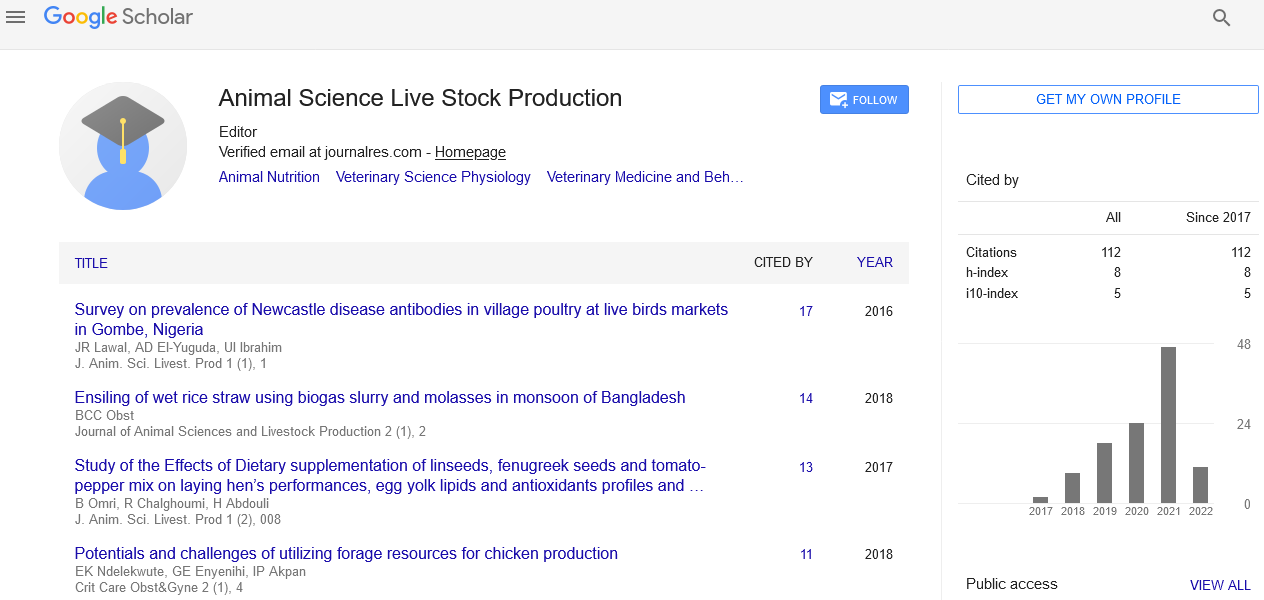Commentary - (2024) Volume 8, Issue 1
The Vital Role of Cattle in Sustaining Global Agriculture
Yan Yoki*
Department of Animal Sciences, Sichuan University, China
*Correspondence:
Yan Yoki,
Department of Animal Sciences, Sichuan University,
China,
Email:
Received: 28-Feb-2024, Manuscript No. IPJASLP-24-19307;
Editor assigned: 01-Mar-2024, Pre QC No. IPJASLP-24-19307 (PQ);
Reviewed: 15-Mar-2024, QC No. IPJASLP-24-19307;
Revised: 20-Mar-2024, Manuscript No. IPJASLP-24-19307 (R);
Published:
27-Mar-2024, DOI: 10.36648/2577-0594.8.1.03
Description
Cattle, often referred to as the backbone of agriculture,
have been integral to human civilization for millennia. From
providing sustenance to contributing to economic prosperity,
these bovine creatures hold a significant position in the world’s
agricultural landscape. With their multifaceted contributions
spanning food production, labor, and ecological balance, cattle
play a vital role in sustaining global agriculture. At the heart
of the cattle’s importance lies their role in food production.
As a primary source of meat and dairy, cattle are essential for
meeting the nutritional needs of billions of people worldwide.
Beef, in particular, is a staple in many diets, providing essential
proteins, vitamins, and minerals. Additionally, dairy products
like milk, cheese, and yogurt are rich sources of calcium and
other nutrients crucial for human health. The demand for these
products continues to rise with the growing global population,
underscoring the indispensability of cattle in feeding the world.
Beyond their role as a food source, cattle also contribute
significantly to the agricultural economy. Livestock farming,
including cattle rearing, constitutes a substantial portion of the
global agricultural sector, generating employment opportunities
and income for millions of people. In rural areas especially, cattle
farming serves as a primary livelihood for farmers, supporting
their families and fostering economic development. Moreover,
the trade of cattle and related products forms a vital component
of international commerce, driving economic growth and
prosperity. Cattle are not only providers of food and economic
benefits but also contribute to environmental sustainability
and ecological balance. Through their grazing activities, cattle
help maintain grasslands and prevent the spread of invasive
plant species, promoting biodiversity and preserving natural
habitats. Furthermore, their manure serves as a valuable
organic fertilizer, enhancing soil fertility and promoting crop
growth. When managed sustainably, cattle farming can even
contribute to carbon sequestration, mitigating climate change
by maintaining healthy soil ecosystems. In addition to their
tangible contributions, cattle also hold cultural and symbolic
significance in many societies. They feature prominently in
various cultural practices, ceremonies, and religious rituals,
symbolizing wealth, fertility, and prosperity. Moreover, cattle
breeds often have deep historical roots, reflecting centuries
of selective breeding and adaptation to diverse environments.
Preserving these breeds is not only essential for maintaining
genetic diversity but also for safeguarding cultural heritage
and traditional knowledge associated with cattle farming.
However, despite their numerous benefits, cattle farming
also presents challenges and controversies. Concerns about
environmental degradation, animal welfare, and public health
have prompted calls for more sustainable and ethical practices
within the industry. Efforts to mitigate these issues include
implementing responsible grazing techniques, reducing
greenhouse gas emissions, and improving animal welfare
standards. Additionally, advancements in technology, such as
precision agriculture and genetic selection, offer opportunities
to enhance the efficiency and sustainability of cattle farming
while minimizing its negative impacts. In conclusion, cattle
are indispensable assets to global agriculture, serving as
providers of food, economic opportunities, and environmental
benefits. Their contributions extend beyond mere sustenance,
encompassing cultural, social, and ecological dimensions. As we
navigate the complexities of modern agriculture, it is imperative
to recognize the importance of cattle and strive towards a
balanced and sustainable approach to their management. By
embracing innovation, promoting responsible practices, and
respecting the inherent value of cattle, we can ensure that they
continue to play a central role in nourishing and sustaining our
world for generations to come.
Acknowledgement
None.
Conflict Of Interest
None.
Citation: Yoki Y (2024) The Vital Role of Cattle in Sustaining Global Agriculture. J Animal Sci. 8:03.
Copyright: © 2024 Yoki Y. This is an open-access article distributed under the terms of the Creative Commons Attribution License, which permits unrestricted use, distribution, and reproduction in any medium, provided the original author and source are credited.

